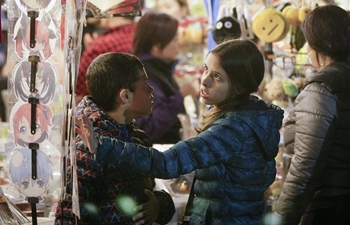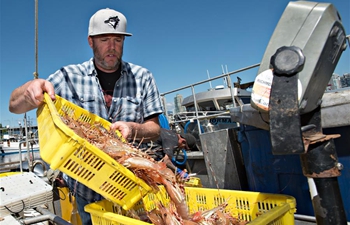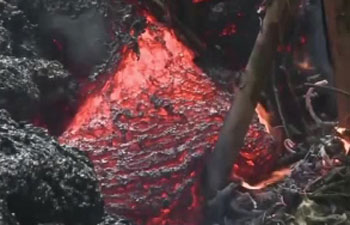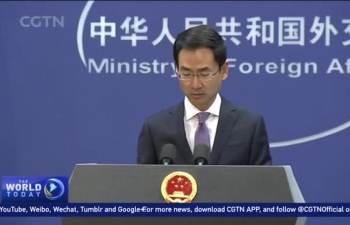By Julia Pierrepont III
SAN JOACHIM, the United States, May 12 (Xinhua) -- Bustling into the room on a wave of irrepressible energy and enthusiasm, it is easy to see how Margaret Wong has been so successful running her McWong Environmental and Energy Group and helping people in California and China grab the brass ring in international trade deals.
In 2012, after building her own McWong business, a LED producer, into a 100 million U.S. dollars powerhouse, Wong decided to launch a consulting business -- California Center -- to help other businesses and entrepreneurs navigate the complicated waters of international trade between the U.S. and China.
"Margaret Wong has been a good and gracious friend to California. Her deep roots in both China and California have enabled her to build strong bridges between us," Susanne Sterling, Vice President of International Affairs for the California's Chamber of Commerce, has told Xinhua.
Since doing business with China in 1984, Wong has frequently been called upon by multiple California governors to help facilitate business relationships and opportunities between the two countries and she gave some legendary back to them.
Her biggest deal to date was helping bring the NBA to China.
"It was considered by many as a laughable idea," Wong recalled when she first proposed the idea. "They asked who watches basketball in China? But David Stern, the NBA commissioner, recognized the opportunity and took the advice."
Today, NBA-China is worth 4.5 billion dollars.
She also helped set up a multi-million dollar deal in the state of Texas to build a Chinese steel plant to manufacture seamless piping for the U.S. oil industry which employs hundreds of American steel workers.
But, that string of successes is in danger of screeching to a halt -- a victim of the escalating trade frictions between the United States and China ignited by the Trump administration in March.
"My own LED company is being impacted," Wong said. "If the 25 percent tariffs against steel stays in place, we might have to move our factory from China to Vietnam."
"I am going to fly to Washington D.C. to talk to them immediately. If the U.S. holds a gun on China, China will retaliate," she told Xinhua in an interview. "China consumers are hungry for California products. We have to help our clients navigate this trade storm."
Wong serves on the Board of Directors for the California Chamber of Commerce, Board of California's Asian Chamber of Commerce, and she was the former President of the U.S.-China Trade & Business Association.
"Last year, China had opened up to imports from U.S. rice farmers. Now, that's going nowhere. And we'd negotiated a terrific deal for American farmers for China to buy 50 percent of all the Sorghum the US produces. After shipping just one container, that deal is dead now," Wong lamented.
"And we are getting calls from our agricultural clients who are worried about what their future will be with China pulling back," Wong continued, who was honored in 2012 with the U.S. Presidential "E" Award for Excellence in Exporting.
These are amongst the first real fatalities of the U.S.-China trade disputes, but far from the last if the bullying trade policy designed by Washington was not abandoned.
"CA agricultural business across the board will be impacted by this trade war: fruit, nut, and row crops. It's a concern for all CA farmers and our wine industry," Sterling said.
After battling drought, mountains of regulatory red tape, labor scarcity and water rate hikes, farmers in San Joachim Valley are facing an even larger hurdle: will there even be a market for their products when they're harvested?
Since China accounts for 2 billion dollars in imports of California agricultural products, according to the CA Department of Food and Agriculture, the unpredictability of Trump's trade negotiations has California growers on edge.
Farm women, who share the backbreaking labor of farm work with their husbands and children and have long been considered "terra firma" in farming country, are concerned about the current trade imbroglio.
Laura Tower, grandmother of a third-generation farm family in the San Joachim Valley, America's breadbasket, worried about the devastating effect a trade war could have on her agricultural community and her family.
"My son plowed under our row crops and took out a loan to plant nut trees. That's a big gamble because they take five years to produce and that's five years carried at a loss," she told Xinhua at her Modesto ranch, about 500 km north of Los Angeles.
"That's a long time to have with no money coming in. So, there better be a market for them in China when it's all said and done or it'll go poorly for us."
Her friend and neighbor, Rose Taginelli, the matriarch of a large, fourth-generation San Joachim farm family, concurred. "That's five expensive years of planting and pruning and fertilizing and spraying and picking. And we don't know what's going to happen with President Trump and these trade problems."
"Everyone's worried. Between them and the regulations and safety issues and water issues, it's a constant struggle just to stay ahead. I hope we can hold on," she added. "We're proud to be farmers. Farming used to be fun ... But, it isn't any more."













